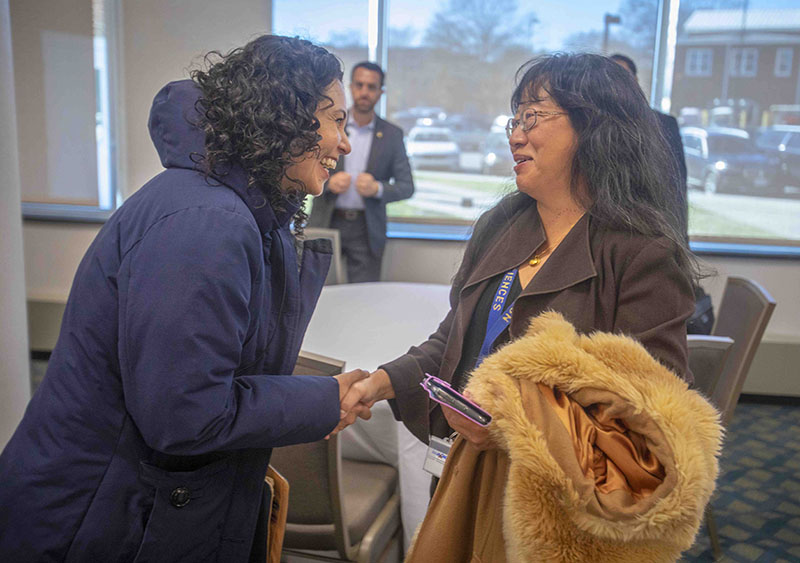
USDA Announces Investment in CAES Environmental Justice Project during Campus Visit
By Lydian Bernhardt / 01/25/2024 College of Agriculture and Environmental Sciences
- 4-H and Youth Development News
- Academic Affairs News
- Accounting and Finance News
- Administration and Instructional Services News
- Admissions News
- Agribusiness, Applied Economics and Agriscience Education News
- Agricultural and Natural Resources News
- All News
- Alumni News
- Animal Sciences News
- Applied Engineering Technology News
- Athletics News
- Biology News
- Built Environment News
- Business and Finance News
- Business Education News
- CAES News
- CAHSS News
- Chancellor's Speaker Series
- Chancellors Town Hall Series
- Chemical, Biological, and Bio Engineering News
- Chemistry News
- Civil, Architectural and Environmental Engineering News
- COAACH News
- COE News
- COED News
- College News
- Community and Rural Development News
- Computational Science and Engineering News
- Computer Science News
- Computer Systems Technology News
- Cooperative Extension News
- COST News
- Counseling News
- Criminal Justice News
- Deese College News
- Economics News
- Educator Preparation News
- Electrical and Computer Engineering News
- Employees News
- Energy and Environmental Systems News
- English Department News
- Faculty News
- Family and Consumer Sciences News
- Graphic Design Technology News
- Hairston College News
- Headlines News
- History & Political Science News
- Honors College News
- Human Resources News
- Industrial and Systems Engineering News
- Information Technology Services News
- Innovation Station News
- Journalism & Mass Communication
- JSNN News
- Kinesiology News
- Leadership Studies and Adult Education News
- Liberal Studies News
- Library News
- Magazine News
- Management News
- Marketing News
- Mathematics News
- Mechanical Engineering News
- Media Spotlight News
- Natural Resources and Environmental Design News
- News Categories
- Nursing News
- Physics News
- Psychology News
- Research News
- Social Work News
- Staff News
- Strategic Partnerships and Economic Development News
- Student Affairs News
- Students News
- The Graduate College News
- Transportation & Supply Chain
- University Advancement News
- Visual & Performing Arts News
EAST GREENSBORO, N.C. (Jan. 25, 2024) – U.S. Department of Agriculture Deputy Secretary Xochitl Torres Small made her inaugural visit to North Carolina Agricultural and Technical State University to see firsthand the ways the College of Agriculture and Environmental Sciences (CAES) is using the federal agency’s funding to advance programs, research and scholarships.
She also came to bring good news: USDA’s National Institute of Food and Agriculture (NIFA) will invest nearly $1 million in a new A&T project to help advance environmental justice in agriculture through its Agricultural and Food Research Initiative (AFRI.)
“Under Secretary Tom Vilsack’s leadership, USDA is working to create new career opportunities for the next generation of farmers, foresters, researchers and entrepreneurs at N.C. A&T,” Torres Small said. “This work will better position rural America to build economic prosperity, invest in agricultural research and give students the chance to succeed in the communities they love.”
 The four-year project, led by Chyi Lyi “Kathleen” Liang, Ph.D., W.K. Kellogg Distinguished Professor of Sustainable Agriculture, will help government agencies identify strategies to evaluate the effectiveness of public investments in underserved communities, particularly those investments involving climate change, food and nutritional security and workforce development.
The four-year project, led by Chyi Lyi “Kathleen” Liang, Ph.D., W.K. Kellogg Distinguished Professor of Sustainable Agriculture, will help government agencies identify strategies to evaluate the effectiveness of public investments in underserved communities, particularly those investments involving climate change, food and nutritional security and workforce development.
“USDA makes lots of grants. The challenge is to identify what happens to the stakeholders as time goes by once the funds have been invested,” Liang said. “During the course of a project, of course, impact is being felt. But what about two years later? Or four years? Is the project still a good, impactful investment? That’s what this study plans to assess.”
The team includes researchers from the University of Florida, North Carolina Central University and the University of California Berkeley.
While touring the University Farm, Torres Small and her team learned about such USDA-funded projects as climate-smart soils and cover cropping; production of niche crops, such as ginger; and toured the University Farm Pavilion and the Farm to see the dairy’s Automated Milking System at work.
She also took a campus tour of CAES buildings with ongoing USDA-funded projects and renovations, and met with the college’s undergraduate USDA Scholars and 1890s Scholars for a question and answer session in Webb Hall.
The A&T stop is part of the deputy secretary’s multi-college national tour.
“What excited me the most about coming here today, and seeing all of these different programs, is that the Farm Pavilion is ‘the place to be’ on campus. It’s exciting for me to hear that agriculture is the place to be,” Torres Small said.
“Coming from USDA, I know that the work we do touches people every day, but to see how the future of ag looks here, with excited students who are taking on climate change through agricultural practices; making sure there’s a secure food supply chain; and developing more and better markets through research developed right here at A&T, and then sharing those practices with the community, is very exciting.”
The four-year AFRI grant begins in July 2024.
“The future of agriculture is the future of all of us,” Torres Small said. “It’s making sure everyone has healthy food, but it’s also about making sure that we make sure agriculture is thriving in the places we’re from – the urban areas as well as the rural communities. When we invest in agriculture, we’re investing in rural communities, but we’re also investing in all of us. “
Media Contact Information: llbernhardt@ncat.edu



